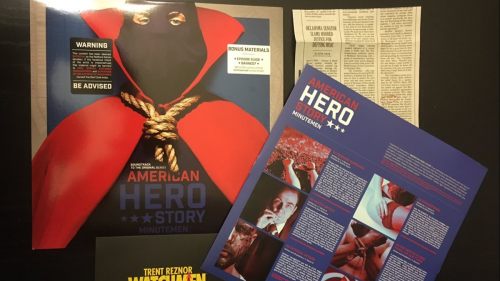What’s In A Name? ScoreKeeper Explores Michael Giacchino’s Punny Track Titles
I love creativity. I believe we should be creative in everything we do from the most minimal mundane tasks to our grandest enterprises. We should seek out opportunities to flex our creative muscles and seize them with fervor. While it’s relatively easy to gaze upon (or listen to) great works of art and assess the degree of artistry and innovation that went into their creation, sometimes the most impressive fruits of our imagination come from surprisingly unsuspecting sources.
In the last several decades or so, filmmakers, screenwriters, novelists, songwriters and other creatives have taken a minimalist approach to titling their works. The popular “The (insert noun here)” formula for titling a work has been so ubiquitous over the years, I wonder if there are any nouns in the dictionary left to use. I’ve always been a little disappointed by this method of titling a work. While there are certainly some clever examples of its application, I mostly find them boring and without creative pizazz.
Imagine if Eternal Sunshine of the Spotless Mind (2004) had been titled The Dream. Or if One Flew Over the Cuckoo’s Nest (1975) was simply The Hospital or A History of Violence (2005) had been known as The Hit Man, or Raiders of the Lost Ark (1981) titled The Adventurer. Instantly, these thoughts unfairly diminish the quality of these films simply because their poetic titles no longer express the brilliance of their respective works.
The title is often our first impression of any work of art and it should go a long way toward creatively capturing its essence. I feel like artists and entertainers are either bored, lazy, or simply disinterested in spending the time necessary to come up with an inventive title. It should also be noted that there is an inherent ease in marketability when your film, book, song, or band name has a simple title; however, it’s a double-edged sword. While I’m sure people would much rather see a film titled Eternal Sunshine of the Spotless Mind, it’s easier for them just to go to the box office and say, “What was that film I wanted to see? Oh yeah, one ticket for The Dream please.” From a marketing perspective, the simpler the title, the easier it is to remember, and the easier it is to sell.
Sometimes the minimalist approach works brilliantly like The Others (2001), The Warriors (1979), The Rocketeer (1991), The Terminator (1984), The Expendables (2010), or The Matrix (1999) simply because their singular words spark imagination, curiosity, and intrigue making them extremely alluring. Sometimes the singular noun approach contains a double-meaning like The Mission (1986), making its choice evocative and heady. Even a single adjective or verb preceding the titular noun can vastly upgrade a title like The Dark Knight (2008), The Little Mermaid (1989), The Straight Story (1999), The Right Stuff (1983), The Monster Squad (1987), or The Illustrated Man (1969).
However, the prolific wildfire-like spread of singular noun titles like The Walk (2015), The Rite (2011), The Forest (2016), The Firm (1993), The Core (2003), The Field (1990), The Lover (1992), The Martian (2015), The Town (1992), The Aviator (2004), The Departed (2006), or The Witch (2016) doesn’t adequately reflect the inspiring power of their respective films.
This practice has existed for as long as humans have expressed themselves through art, including the world of film music. Bernard Herrmann, who I consider one of the greatest film composers who ever lived, titled all his cues with as little creativity as he could. For example, take a look at these cues Herrmann self-titled from his score to Psycho (1960)…
The City
The Rainstorm
The Peephole
The Murder
The Clean Up
The Car
The Swamp
The Curtain
The Search
The Stairs
The Knife
The 1st Floor
The Search
The Hill
The Bedroom
The Cellar
The Discovery
The Finale
It certainly doesn’t diminish his work, and if you were privileged to know Mr. Herrmann personally, you’d understand why this makes perfect sense. He was a no-nonsense, perfunctory, ultra-forward pragmatic. These track titles weren’t necessarily him not being creative, but rather a reflection of his personality.
In all the years of people naming cues for films, none have expressed their composer more, nor tickled the giggles more than Michael Giacchino. Since he first blitzed onto the scene with his rousing masterpiece The Incredibles (2004), Giacchino has been naming individual cues using knee-slapping puns chock-full of outside cultural references and ironic wit. It’s a small display of creativity that expresses the man behind the music in more ways than you realize.
Take a look at these selected track titles from a collection of his film scores…
Level Plaguing Field (Dawn of the Planet of the Apes)
Look Who’s Stalking (Dawn of the Planet of the Apes)
Close Encounters of the Furred Kind (Dawn of the Planet of the Apes)
Caesar No Evil, Hear No Evil (Dawn of the Planet of the Apes)
The Apes of Wrath (Dawn of the Planet of the Apes)
Gibbon Take (Dawn of the Planet of the Apes)The Incredits (The Incredibles)
Get Carter (John Carter)
A Thern For The Worse (John Carter)
Carter They Come, Carter They Fall (John Carter)
A Thern Warning (John Carter)Bury the Hatchling (Jurassic World)
The Family That Strays Together (Jurassic World)
As The Jurassic World Turns (Jurassic World)
Owen You Nothing (Jurassic World)
Indominus Wrecks (Jurassic World)
It’s a Small Jurassic World (Jurassic World)
The Brockway Monorail (Jurassic World) (A reference from “Marge vs. The Monorail” episode of The Simpsons where Lyle Lanley says, “I’ve sold monorails to Brockway, Ogdenville, and North Haverbrook, and, by gum it put them on the map!”Swamp and Circumstance (Land of the Lost)
Pterodactyl Ptemper Ptantrum (Land of the Lost)
End Credits Can Suck It! (Land of the Lost)The Asphalt Jungle Gym (Let Me In)
Killer In-Stinks (Let Me In)The Eyeland (Lost)
Hollywood and Vines (Lost)
Locke’ing Horns (Lost)
Karma Jin-Itiative (Lost)
C4-Titude (Lost)
Of Mice and Ben (Lost)Hellavacopter Chase (Mission: Impossible III)
Schifrin and Variations (Mission: Impossible III)Give Her My Budapest (Mission: Impossible IV)
From Russia With Shove (Mission: Impossible IV)
Moreau Trouble Than She’s Worth (Mission: Impossible IV)
Putting the Miss in Mission (Mission: Impossible IV)Remy Drives A Linguini (Ratatouille)
Heist to See You (Ratatouille)
End Creditouilles (Ratatouille)Vroom and Board (Speed Racer) (A reference to the Wile E. Coyote and Roadrunner Looney Tunes short “Zoom and Bored”)
Sub Prime Directive (Star Trek Into Darkness)
London Calling (Star Trek Into Darkness)
The Kronos Wartet (Star Trek Into Darkness)
Buying the Space Farm (Star Trek Into Darkness)
Cryo Your Heart Out (Star Trek Into Darkness)Hack To The Future (Star Trek)
Nailin’ The Kelvin (Star Trek)
Enterprising Young Men (Star Trek)
I’ve Fallen And I Can’t Beam Up! (Star Trek)
Nice To Meld You (Star Trek)
Does It Still McFly? (Star Trek)We’ll Fix It In Post-Haste (Super 8)
Lambs On The Lam (Super 8)You’ve Peaked My Pin-Trist (Tomorrowland)
Boat Wait There’s More (Tomorrowland)
Home Wheat Home (Tomorrowland)
Pin Ultimate Experience (Tomorrowland)
What An Eiffel (Tomorrowland)
Welcome Back Walker (Tomorrowland)
As The World Burns (Tomorrowland)
Sphere and Loathing (Tomorrowland)
The Hail Athena Pass (Tomorrowland)Motel Me A Scary Story (Toy Story of Terror!)
What’d It Have To Be Crawl Spaces? (Toy Story of Terror!)
Iguana Be Kidding Me (Toy Story of Terror!)
Nobody Puts Jessie In The Box (Toy Story of Terror!)
Rock ‘Em Box ‘Em Robots (Toy Story of Terror!)Up With Titles (Up)
Kevin Beak’n (Up)Ticket to Write (Zootopia)
Some of My Best Friends Are Predators (Zootopia)
Ewe Fell For It (Zootopia)
Stephen Davis has been one of Michael’s primary music editors since 2001 and is largely credited with giving Giacchino’s cues their punny titles. “I’m afraid it’s probably my fault,” admits Davis. “For better or worse, I have that kind of sense of humor and certain things just strike me as funny. Making a play on words, or character names, or using old references to describe scenes makes me laugh. Over the course of a movie, or television series especially, we’re responsible for coming up with so many unique cue titles. It gets old when you see cues repeatedly named, ‘Hallway,’ or better yet, ‘Hallway #2.’ This was a way to keep it fresh and enjoyable.”
Stephen and Michael first worked together on the television series Alias (2001-2006) where their collective sense of humor blossomed. “It all began with Alias.” recounts Davis. “One of the earliest funny titles we created was for a cue called, ‘Hassan Chop.’ This was used for a scene involving a character named Hassan, who appeared over a particular arc of episodes. The reference goes back to one of my favorite Looney Tunes cartoons featuring Bugs Bunny and Daffy Duck entitled, ‘Ali Baba Bunny’ (1957). Bugs and Daffy happen upon a cave filled with treasure that was being protected by Hassan the guard. While chasing after Daffy Duck with a large sword in his hands, he would scream out ‘Hassan Chop!’ Luckily, Michael has a great sense of humor and since he and I are close to the same age, we enjoy the same references — especially when it comes to TV shows from our adolescence. Happily, the tradition was passed on to Alex Levy and Paul Apelgren when they came aboard as part of Michael’s music editing team. I’m proud to say they have pushed the standard to new heights!”
Paul Apelgren cut his teeth on the show Fringe (2008-2013) and has been a part of Giacchino’s music editing team for the last decade. “I’ve kept the naming tradition going with anything related to Giacchino (and sometimes my own projects),” Apelgren reveals. “The studio and labels haven’t really had an issue with this process. Sometimes a director will take umbrage, but not to the point where he or she demands a new track title. I have yet to experience a rejection except from Michael himself if a track title is too weak (as in, the pun is too esoteric or worse, there is no pun)."
The status quo practice of giving a cue a generic name like ‘Hallway’ or ‘Chase’ largely comes out of necessity. There just isn’t that much time available to be sitting around thinking of cue titles. Fortunately, Davis found a way to make the process quick and relatively painless. “I try to use the first thing that comes into my head,” explains Davis. “Michael needs the cue information as quickly as possible so he can start doing his work. If it doesn’t happen quickly, then it’s probably not going to be very funny anyway. When that occurs, I have to go against my better wishes and use something less clever like a piece of dialogue from the scene, or a scene location. I try to avoid this though, since Michael will give me a little crap when he knows I settled, and that it’s not my best work! We really hate lost opportunities!”
Each music editor on Giacchino’s team has their own personal favorites. “There are so many that I’m a fan of,” Davis confesses. “In addition to the cues that appear on the soundtracks, there are hundreds of other titles that people have never seen. From the ones I’ve created, these are some of my favorites… ‘Going In Seine’ from Ratatouille, when Linguini is told to throw Remy into the Seine River, ‘Does it Still McFly’ and ‘Black Holes Have A Lot of Pull’ from Star Trek and ‘The Lemon Pledge’ from Cars 2. Also, ‘Kevin Brek’n’ from Up, for when we meet Kevin the bird, and ‘Jumping the Thark’ from John Carter. We’ve had some good end credit cues titles too. ‘The Incredits’ and ‘End Creditouilles’ are a couple of my favorites. The list could go on and on…”
Apelgren is particularly partial to the literary puns. “A number of Let Me In cues uses Shakespeare as a starting point,” explains Apelgren. “Especially ‘Romeo and Juliet’ because that play pops up in the movie briefly. The first time I knew I was onto something with some of these titles was when I named a Lost cue ‘Separation of Search and Kate’. Michael really liked that one. I still think of it fondly. Dawn of the Planet of the Apes was probably a high point with ‘Monkey See, Monkey Coup’, or ‘Close Encounters of the Furred Kind’. More recently, Jurassic World there was ‘Does This Dino Make Jurassic Look Big?’ Not so literary I guess, but it got a laugh and a groan probably simultaneously.”
Giacchino is also partial to the tradition of using the “World’s Worst” moniker to begin a particular track title. Take a look at these entries from various film cues Giacchino composed…
World’s Worst Beach Party (Lost)
World’s Worst Landscaping (Lost)
World’s Worst Car Wash (Lost)
World’s Worst Parking Valet (Mission: Impossible - Ghost Protocol)
World’s Worst Shop Keepers (Tomorrowland)
World’s Worst Curtain Call (Toy Story of Terror!)
World’s Worst Last Four Minutes to Live (Mission: Impossible 3)
World’s Worst Road Rage (Speed Racer)
World’s Worst Field Trip (Super 8)
World’s Worst Hospital (Alias)
World’s Worst Animal Shelter (Zootopia)
Galaxy’s Worst Sushi Bar (Star Trek)
Music editor Stephen Davis recalls how this particular trend began, “I don’t remember what prompted me to use ‘World’s Worst,’ but likely, it was because I couldn’t come up with anything better. I looked through our database of cue titles, and the first one I found was from Season 2, Episode 1 of Alias. The cue was called, ‘World’s Worst Hospital.’ I think it described a run-down post-war mental facility in Russia where the bad guys were performing human experiments.”
“The references just got more ridiculous from then on,” Davis explains. “There was ‘World’s Worst Manicure’ where a man is getting his fingers chopped off as motivation to provide information; ‘World’s Worst Carpool,’ when a tied-up woman is thrown out of a speeding van; we even had a ‘Galaxy’s Worst Sushi Bar,’ from Star Trek. My favorite is probably ‘World’s Worst Last Four Minutes to Live’ from Mission: Impossible 3. It describes a scene where Ethan has four minutes to live unless he can miraculously save himself (which he did, of course).”
Sometimes Davis will look for additional titling traditions to incorporate like the inclusion of the word “dash.” Davis explains, “In The Incredibles we had a cue title ‘100 Mile Dash’. Since then, on our Pixar projects, I’ve always tried to find a place to put a cue title with the word ‘dash’ in it. In Ratatouille we used the title ‘100 Rat Dash,’ when the rat colony is running from the old lady with the shotgun. In Up we had a cue called ‘Three Dog Dash,’ when Alpha and the other two dogs run out to track down Doug. Most recently on Inside Out, there was ‘Dash for Home’ for when Riley decides to run away and go back to Minnesota. I’m still kicking myself to this day because I didn’t use ‘A Dash of Lemons’ for Cars 2. It’s the only Pixar movie we’ve worked on that has no ‘dash’ cue.”
Both Davis and Apelgren are aware that not everybody shares their sense of humor and flair for creative track titling. “To me, they’re all great!” Davis exclaims, “But if you read some of the soundtrack forums on the internet, you might find there are those who have a different opinion! One title in particular that was moaned about was ‘Hella Bar Talk’ from Star Trek. It was a play on the name of the composer Bela Bartok and describes the bar scene where Kirk is being encouraged to join Star Fleet Academy."
“There are people out there,” Davis continues, “who, obviously, are huge fans of movie soundtracks, and we really love that they take the music so seriously. We’ve read a lot of the online forums where Michael’s cue titles have been discussed and they can be an awesome read! Some really appreciate the titles while others are adamant about how much they hate them, going so far as to change the titles more to their liking when they load the soundtracks onto their computers!”
Apelgren chimes in, “A lot of people hate them and say things like, ‘Does he not take this seriously? How DARE he be goofy with something so important’ or — and this is a real quote, ‘Giacchino’s gonzo cue titles disrespect the entire production.’ In the end, the proof he takes his job seriously is how inventive and rousing his scores are. You can look at his track record — the directors he collaborates with ask him back over and over because he takes storytelling seriously and he has the ability to elevate a movie or television show with his work.”
“Michael tries to make his scoring sessions fun instead of work,” Apelgren continues, “but in the end, the amount of work to get these produced would astound anyone used to a 9-5 job. Hundreds of people are involved with just this one facet of a movie. The track titles get a little laugh or a groan or spawn further jokes in the midst of what is usually an intense schedule where everyone is exhausted. The cue titles are such an incredibly small part of this whole process that perhaps they shouldn't be inflated to such a degree of importance. They are small but little things make a big difference when you are working so hard. If they ruin someone's experience of the music, I'm not sure they are really listening.”
Davis concludes, “We never imagined when we started this that it would become a topic of discussion. It’s something that we have always just done for our own enjoyment, but I admit to taking a little pride in the fact that it was become a ‘thing,’ and that people care enough to comment. Luckily they don’t know who’s really responsible so Alex (Levy), Paul, and I are able to stay out of harm’s way!”



